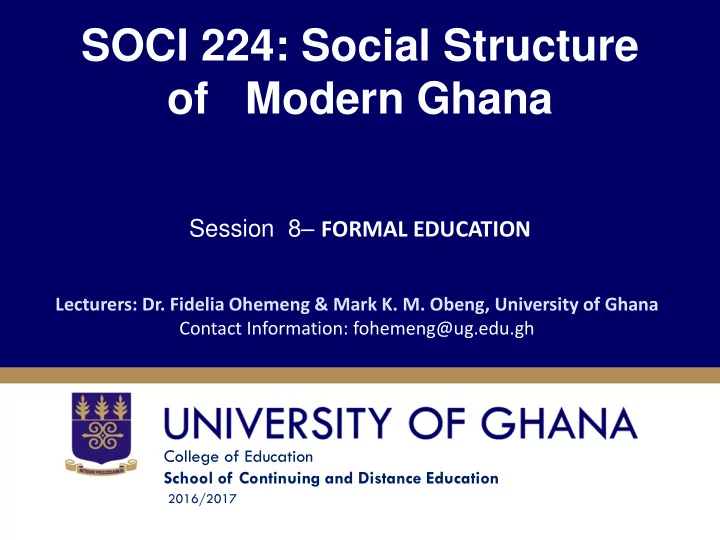

SOCI 224: Social Structure of Modern Ghana Session 8 – FORMAL EDUCATION Lecturers: Dr. Fidelia Ohemeng & Mark K. M. Obeng, University of Ghana Contact Information: fohemeng@ug.edu.gh College of Education School of Continuing and Distance Education 2016/2017
Session Overview If you can read and understand this course, then thanks to formal education. In this session, the origins of formal education, the curriculum as well as its impact on the Ghanaian society will be discussed.
Session Outline • The origins and main objectives of formal classroom education • The Changes in the educational system and the value of formal education • The impact of formal education on the social structure of Ghana
Reading List • Abotchie, C. (2016) Social Change in Ghana . Accra: Hans Publications. Chapter 7 • Nukunya, G. (2014). Tradition and Change in Ghana: an Introduction to Sociology. Accra: Ghana Universities Press. pgs. 155-164
Definition of Formal Education • It is the training process whereby an individual who has progressed beyond primary socialisation learns about and acquires the skills required for his or her survival. • Encompasses those processes by which an individual learns to take account of the social order and to cope with it by some combination of conformity, non- conformity, avoidance and conflicts. • Classroom Education = Secondary Socialisation • Teachers as the key agent
Missionaries And Education Why the missionaries introduced formal education: • As a tool for communication and propagation of the gospel. • The school had greater appeal than the gospel. • Baptism was a requirement for admission into the schools • Education and the gospel went hand in hand. Rowe: “ greater attention must be paid to our school work; our only hope is in the young; of the older heathens comparatively little can be expected ”.
Missionaries and Education • The colonialists supported the missionaries because the educated locals could serve them Mission School Year Basel Mission PTC 1848 Methodist Mfantsipim 1876 Anglican Adisadel 1910 Anglican Accra High 1923 Catholic St. Augustine’s 1930
Content of Formal Education • The main focus was the 3 Rs: reading, writing and arithmetic • Other subjects were biblical studies, geography, history, singing and physical training • Christian doctrines were taught. Included: – Monotheism – Moral precepts – Sin – Salvation and the life afterwards – Renunciation of polygyny & multiple wives
Vocational Training • It was the policy of the Basel missionaries to give some attention to vocational training • Additionally, towards the 19 th C colonial administration was expanding and there was the need for artisans such as tailors, carpenters, masons, tailors and clerks • Still the focus was on grammar which was also more appealing that vocational training
Impact on the Social Structure • Alienation of the educated from their traditional culture and environment. Due to content of education and pupils being trained to emulate European lifestyle • Changed the general outlook of the educated. Could communicate with the outside world • Brought greater respect to the educated. Slide 10
Impact Cont. • Tool for wealth, power and social mobility • Weakening of the traditional authority structure • Distortions in the socialization process • Provided Ghanaians with a lingua franca • Contributed to the development of the nation • Brought national integration and cohesion Slide 11
Statistics on Literacy in Ghana Literacy rate in Ghana: • population 11 years and older - 74.1 % literate • Regional – 3 NR Less than 50% – Other regions 69% • Gender – Male= 80.2% – Female 68.5% Slide 12
Assignment • Discuss with relevant illustrations the factors that account for the sharp difference in educational attainment in males and females. – Date and format of submission will be communicated. Slide 13
Recommend
More recommend